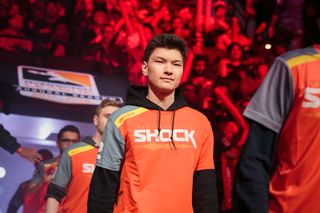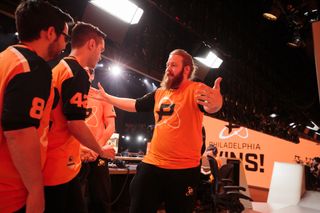Overwatch League matches keep getting better as the worst teams up their game
Between young superstars coming of age and smart player trades, the gap between the best and worst teams is smaller than ever.

The first stage of Overwatch League offered some flashes of amazing professional play, but for the most part teams met expectations, and there was a stark talent gap between the better and worse teams in the League.
Stage two was a very different story. Gone were the obviously one-sided matches, except a few with the top-ranked New York Excelsior and the still-winless Shanghai Dragons. Throughout stage two we got to watch an evolution in professional Overwatch that bodes well for the future of the League. Games were close, exciting, and unpredictable thanks to a narrowing skill gap among the Overwatch League roster. Let's take a look at why.
One part's obvious: Korean rosters and players are still very good. New York, London, and Seoul are full of world class talent, with teams that have played together for quite some time. All are composed of top players from Apex—the defunct Overwatch series from South Korea that was once the ultimate proving ground for pro teams. For better or worse, they're still the teams to beat.
Along those lines, individual Korean players on mixed rosters have also been tearing it up. Perhaps at the top of that list is Jae-Hyeok "Carpe" Lee from the Philadelphia Fusion. Considered one of the best Widowmaker and Tracer players in the League, Carpe has played a crucial role in Philadelphia's recent success. You simply can't deny the results and precision that Korean players bring to the table. In fact, now that Houston, Florida, and Shanghai have had some time to scout some of the available Korean talent, every single team will have at least one South Korean player headed into stage three.
That really highlights one of the biggest reasons we're seeing more success and closer games across the board—teams are beginning to acquire and develop specialized talent. As with other professional sports leagues, Overwatch League allows for teams to engage in player trades and acquisitions within specific time windows during the season. The biggest dealings between stages one and two came from the London Spitfire who sent Chan-Hyung "Fissure" Baek to the Los Angeles Gladiators, and Dong-Jun "Rascal" Kim to the Dallas Fuel. In both cases, each player was able to fill a crucial gap for either team in tanking and DPS, respectively.
A couple of teams also had young players that became eligible during stage two, giving them more options for optimization. The first—and most hyped—was the San Francisco Shock bringing in the $150,000 man himself, Jay "Sinatraa" Won. Sinatraa's Tracer and Zarya are phenomenal, allowing San Francisco to explore more efficient triple tank compositions, and opening the door for DPS stars Dante "Danteh" Cruz and Andrej "Babybay" Francisty to enter more specialized roles.
As we saw all throughout stage two, having the right player to play the right hero on the right map isn't just a luxury—it's often needed to win. San Francisco could very well be a team to beat in stage three now that their other young player, Matthew "Super" DeLisi, has become eligible to step in as the team's main tank.
The biggest gaming news, reviews and hardware deals
Keep up to date with the most important stories and the best deals, as picked by the PC Gamer team.
Philadelphia is the other team that enjoyed quite a bit of success in stage two thanks to a player turning 18 years old. Simon "Snillo" Eckström was a secret weapon for the Fusion in the stage two finals. Utilized mostly on Route 66, Snillo's stealthy Tracer opened the door for tricky dives that proved difficult for London and New York to deal with. Both teams praised the young Swede in post-game conferences, citing his unique tactics as one of the biggest reasons they had trouble finding traction.

Overwatch League teams are paying attention to the rising talent in the Overwatch Contenders tournament, too. Philadelphia, London, and New York, have "academy" teams in Blizzard's path to pro league that started last month. Though nothing has been confirmed, there have been whispers of teams already interested in bringing in Contenders talent at the next trade window.
Obtaining new players and maximizing their utility is just one piece of the puzzle for Overwatch League teams. As we mentioned before, rigorous practice and scrim schedules were a bit of a culture shock when players and coaches first began their OWL journeys. An overall increase in comfort level with their positions has allowed them to fully realize their potential. Even Sinatraa —who told PC Gamer in a Reddit AMA that he was scrimming with the team for eight hours a day prior to meeting eligibility requirement—was able to step seamlessly into his DPS role for San Francisco.
"Now you've got the best players in the world playing against each other day in and day out," says Sam Owens, Head of Operations at OverwatchScore, regarding stage two. "You've got coaches who are just there to help you work on your own improvement, and coaches who just focus on strategy."
In stage two, we've seen many teams step it up and tighten areas of their game that gave them problems in stage one, and a large part of that is thanks to improved coaching. Of particular interest is Vytis "Mineral" Lasaitis, head coach of the Florida Mayhem. Once thought to be in the same league as the lowly Shanghai Dragons, the Mayhem attacked teams quite a bit differently in stage two, even upsetting the Los Angeles Valiant and San Francisco Shock. Mineral has clearly done his homework and helped his team live up to their pre-OWL reputation.
The best team in the League, the New York Excelsior, also have one of the most seasoned coaches on the planet in Hyeong-Seok "WizardHyeong" Kim. All of the New York players often credit their coach when asked why they're so successful, and he usually nods in agreement or raises a triumphant fist. When asked at a press conference what he's been doing more of in stage two, WizardHyeong said that he's been studying the overhead map a lot more to develop better strategies.
Overwatch Contenders teams have also been quite serious with bringing in excellent coaches. New York's developmental team, XL2, recently hired ex-Arc6 coach Pyren "Kitta" Singapan as an analyst and coach. Kitta was instrumental in getting many Overwatch League pros where they are today, including Danteh, Indy "Space" Halpern, and Scott "Custa" Kennedy.
Overwatch League is still very young and has a lifetime of development ahead of it. As teams become more familiar with each other and get more creative with their tactics, the quality of competition should keep getting better. There isn't really a mixed-versus-Korean or West-versus-East dichotomy anymore. Instead, there are twelve hungry teams who continue to improve and show the world why they deserve to be playing on Overwatch's biggest stage.
As Sam Owens puts it, "the ecosystem is set up to take the best and make them better," and that's exactly what we saw happen in stage two.
Most Popular

